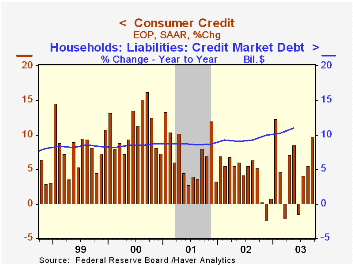 Global| Nov 10 2003
Global| Nov 10 2003Consumer Credit Usage Jumped
by:Tom Moeller
|in:Economy in Brief
Summary
The Federal Reserve reported that consumer credit outstanding (which excludes mortgages) rose $15.1B (9.7% AR) in September. It was the sharpest one-month rise since this past January. Consensus expectations had been for a $6.0B gain. [...]

The Federal Reserve reported that consumer credit outstanding (which excludes mortgages) rose $15.1B (9.7% AR) in September. It was the sharpest one-month rise since this past January. Consensus expectations had been for a $6.0B gain.
During the first nine months of this year, consumer credit usage rose at a 5.4% annual rate.
The surge in non-revolving credit extension (which excludes auto loans) at a 12.5% SAAR in September may have reflected the recent addition of student loans extended by the federal government and Sallie Mae to the Consumer Credit Outstanding figures.Not seasonally adjusted, these loans jumped $4.6B (-6.3% y/y) during September. Loans underwritten by finance companies also were strong, up $5.3B (7.3% y/y).
Revolving credit rose at a 5.0% annual rate in September following a 2.9% gain in August.
An article from the Federal Reserve Bulletin highlighting recent changes to a measure of US household debt service can be found here.
| Consumer Credit Outstanding | Sept m/m | Aug m/m | Y/Y | 2002 | 2001 | 2000 |
|---|---|---|---|---|---|---|
| Total | $15.1B | $8.8B | 3.9% | 4.3% | 7.3% | 11.5% |
| Revolving | $3.0B | $1.7B | 1.9% | 1.5% | 5.1% | 11.6% |
| Nonrevolving | $12.1B | $7.1B | 5.2% | 6.0% | 8.8% | 11.4% |
Tom Moeller
AuthorMore in Author Profile »Prior to joining Haver Analytics in 2000, Mr. Moeller worked as the Economist at Chancellor Capital Management from 1985 to 1999. There, he developed comprehensive economic forecasts and interpreted economic data for equity and fixed income portfolio managers. Also at Chancellor, Mr. Moeller worked as an equity analyst and was responsible for researching and rating companies in the economically sensitive automobile and housing industries for investment in Chancellor’s equity portfolio. Prior to joining Chancellor, Mr. Moeller was an Economist at Citibank from 1979 to 1984. He also analyzed pricing behavior in the metals industry for the Council on Wage and Price Stability in Washington, D.C. In 1999, Mr. Moeller received the award for most accurate forecast from the Forecasters' Club of New York. From 1990 to 1992 he was President of the New York Association for Business Economists. Mr. Moeller earned an M.B.A. in Finance from Fordham University, where he graduated in 1987. He holds a Bachelor of Arts in Economics from George Washington University.
More Economy in Brief
 Global| Feb 05 2026
Global| Feb 05 2026Charts of the Week: Balanced Policy, Resilient Data and AI Narratives
by:Andrew Cates






